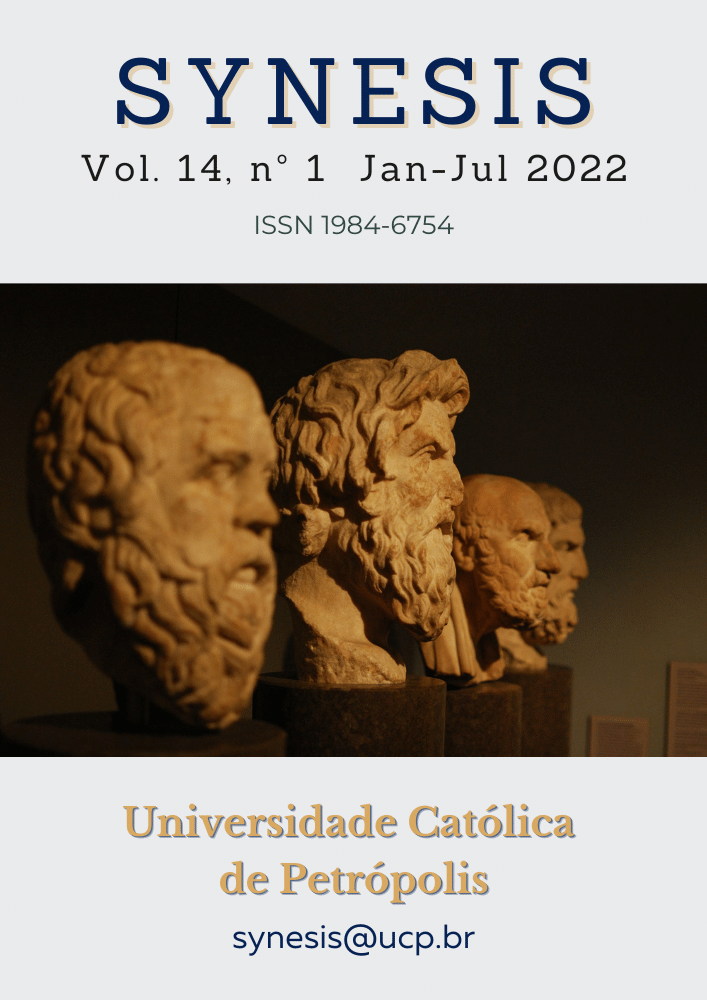Resumo
As a form of social consciousness, the origin and development of the theory of the four virtues is associated with the changing process of economic and social conditions and the development of contemporary Chinese science. Confucian ethics in the Pre-Qin period was born based on certain historical conditions, during a period of great change in China's economy and society when the Eastern Zhou Dynasty (771 - 221 BC) weakened and perished. The doctrine of the four virtues is one of the very important doctrines of Confucianism in the Pre-Qin period, marking a great moral thought of mankind in general and Eastern moral thought in particular, especially in countries with great influenced by Confucianism. In this article, the author will focus on clarifying the cause of birth, the basic content of the theory of four virtues. In addition, the author also proceeds to discuss the merits and limitations of this theory.
Referências
BENDER, L. R. The Corrected Interpretations of the Five Classics (Wujing zhengyi) and the Tang Legacy of Obscure Learning (Xuanxue). T’oung Pao 105, p. 76-127, 2019. https://doi.org/10.1163/15685322-10512P03.
BORTON, L. Behind the Scenes, in the Forefront: Vietnamese Women in War and Peace. ASIANetwork Exchange, 25, n. 1, p. 7–59, 2018. https://doi.org/10.16995/ane.276.
CAMPBELL, J. L. Feminine virtues. In: DE-GAIA, S. (Ed.). Encyclopedia of Women in World Religions: Faith and Culture Across History: ABC-CLIO, 2019. p. 290-291. https://www.abc-clio.com/product/A5144C/
CHENG, L. Three Obediences and the Four Virtues Sāncóng Sìdé 三从四德. In: CHENG, L. (Ed.). Berkshire Encyclopedia of China: Berkshire Publishing Group, 2009. https://doi.org/10.1093/acref/9780190622671.001.0001. Acesso em: Jan 26th, 2022.
CHESNEY-LIND, M.; MORASH, M. Feminist theories of crime. 1st ed. London and New York: Routledge, 2011. 0754629716. https://www.routledge.com/Feminist-Theories-of-Crime/Morash-Chesney-Lind/p/book/9780754629719
CLARK, K. J.; WANG, R. R. A Confucian Defense of Gender Equity. Journal of the American Academy of Religion, 72, n. 2, p. 395-422, 2004. http://www.jstor.org/stable/40005811
COGHLAN, D.; BRYDON-MILLER, M. Confucian Principles. In: COGHLAN, D. e BRYDON-MILLER, M. (Ed.). The SAGE Encyclopedia of Action Research. London: SAGE Publications Ltd, 2014. https://doi.org/10.4135/9781446294406. Acesso em: Jan 27th, 2022.
CONFUCIUS. Book of virtues. Hanoi: Vietnamese Literature Publishing House, 1999.
CSIKSZENTMIHALY, M. Confucius. Mar 31st, 2020. Disponível em: https://plato.stanford.edu/entries/confucius/. Acesso em: Jan 26th, 2022.
DARVILL, T. The concise Oxford dictionary of archaeology. 3rd ed. Oxford University Press, 2021. 9780191842788. https://doi.org/10.1093/acref/9780191842788.001.0001.
DIEM, A. D. Ancient Chinese Education. Ho Chi Minh City: Tre Publishing House, 2001.
DURANT, W. Our Oriental Heritage: The Story of Civilization, Volume I. New York: Simon and Schuster, 2011. 1049 p. 9781451646689. https://www.simonandschuster.ca/books/Our-Oriental-Heritage/Will-Durant/The-Story-of-Civilization/9781451646689
ELSTEIN, D. Beyond the five relationships: Teachers and worthies in early Chinese thought. Philosophy East and West, 62, n. 3, p. 375-391, 2012. http://www.jstor.org/stable/41684457
FENGYAN *, W. Confucian thinking in traditional moral education: key ideas and fundamental features. Journal of Moral Education, 33, n. 4, p. 429-447, 2004/12/01 2004. https://doi.org/10.1080/0305724042000327984.
FRENIER, M. D.; MANCINI, K. Vietnamese Women in a Confucian Setting: The Causes of the Initial Decline in the Status of East Asian Women. In: BARRY, K. (Ed.). Vietnam’s Women in Transition. London: Palgrave Macmillan, 1996. https://doi.org/10.1007/978-1-349-24611-3_2.
GAO, X. Women Existing for Men: Confucianism and Social Injustice against Women in China. Race, Gender & Class, 10, n. 3, p. 114-125, 2003. http://www.jstor.org/stable/41675091
GOLDIN, P. R. Confucianism. London: Routledge, 2014. 240 p. 9781315711621. https://doi.org/10.4324/9781315711621.
HIGGINS, K. M. Loyalty from a Confucian perspective. Nomos, 54, p. 22-38, 2013. http://www.jstor.org/stable/24220172
KELKAR, G.; NATHAN, D. Witch Hunts: Culture, Patriarchy, and Transformation: Culture, Patriarchy and Structural Transformation. Cambridge: Cambridge University Press, 2020. 284 p. 9781108490511. https://www.cambridge.org/vn/academic/subjects/sociology/sociology-gender/witch-hunts-culture-patriarchy-and-structural-transformation
KINNEY, A. B. Women in the Analects. In: GOLDIN, P. R. (Ed.). A Concise Companion to Confucius, 2017. p. 148-163. https://doi.org/10.1002/9781118783863.ch7.
MA, Y.; FULLER, B. T.; SUN, W.; HU, S. et al. Tracing the locality of prisoners and workers at the Mausoleum of Qin Shi Huang: First Emperor of China (259-210 BC). Scientific Reports, 6, n. 1, p. 26731, 2016/06/02 2016. https://doi.org/10.1038/srep26731.
NGUYEN, T. N. Social Justice for Women from the Perspective of their Participation in Politics – Practice of Vietnam. Journal of Educational and Social Research, 5, n. 1, p. 351-358, 2015. https://doi.org/10.5901/jesr.2015.v5n1p351.
PANG-WHITE, A. A. (ed.). The Confucian Four Books for Women: A new translation of the Nü Sishu and the commentary of Wang Xiang. Oxford University Press, 2018. 344 p. https://global.oup.com/academic/product/the-confucian-four-books-for-women-9780190460891
REN, J. Beyond Mencius and Xunzi: A Third Approach to Confucianism. Journal of Chinese Humanities, 6, n. 1, p. 77-91, 04 Dec. 2020 2020. https://doi.org/10.1163/23521341-12340091.
SHEN, C. Early urbanization in the Eastern Zhou in China (770—221 BC): an archaeological view. Antiquity, 68, n. 261, p. 724-744, 1994. https://doi.org/10.1017/S0003598X00047438.
TRAN, L. H. N. Building soft skills for employability: Challenges and practices in Vietnam. 1st ed. Routledge, 2019. 264 p. 9781032089508. https://www.routledge.com/Building-Soft-Skills-for-Employability-Challenges-and-Practices-in-Vietnam/Nghia/p/book/9781032089508
TSIN, M. CHINA—Timeline of Historical Periods. Asia in Western and World History: A Guide for Teaching, 1995. Disponível em: http://afe.easia.columbia.edu/timelines/china_timeline.htm. Acesso em: Jan 26th, 2022.
XIE, Z. Regarding men as superior to women: impacts of Confucianism on family norms in China. China Popul Today, 11, n. 6, p. 12-16, Dec 1994. https://pubmed.ncbi.nlm.nih.gov/12290499/
ZHAO, Y.; SELIGMAN, M.; PENG, K.; YE, L. et al. Agency in ancient China. The Journal of Positive Psychology, p. 1-15, 2021. https://doi.org/10.1080/17439760.2021.1926533.

Este trabalho está licenciado sob uma licença Creative Commons Attribution-NonCommercial-NoDerivatives 4.0 International License.
Copyright (c) 2022 Synesis (ISSN 1984-6754)
